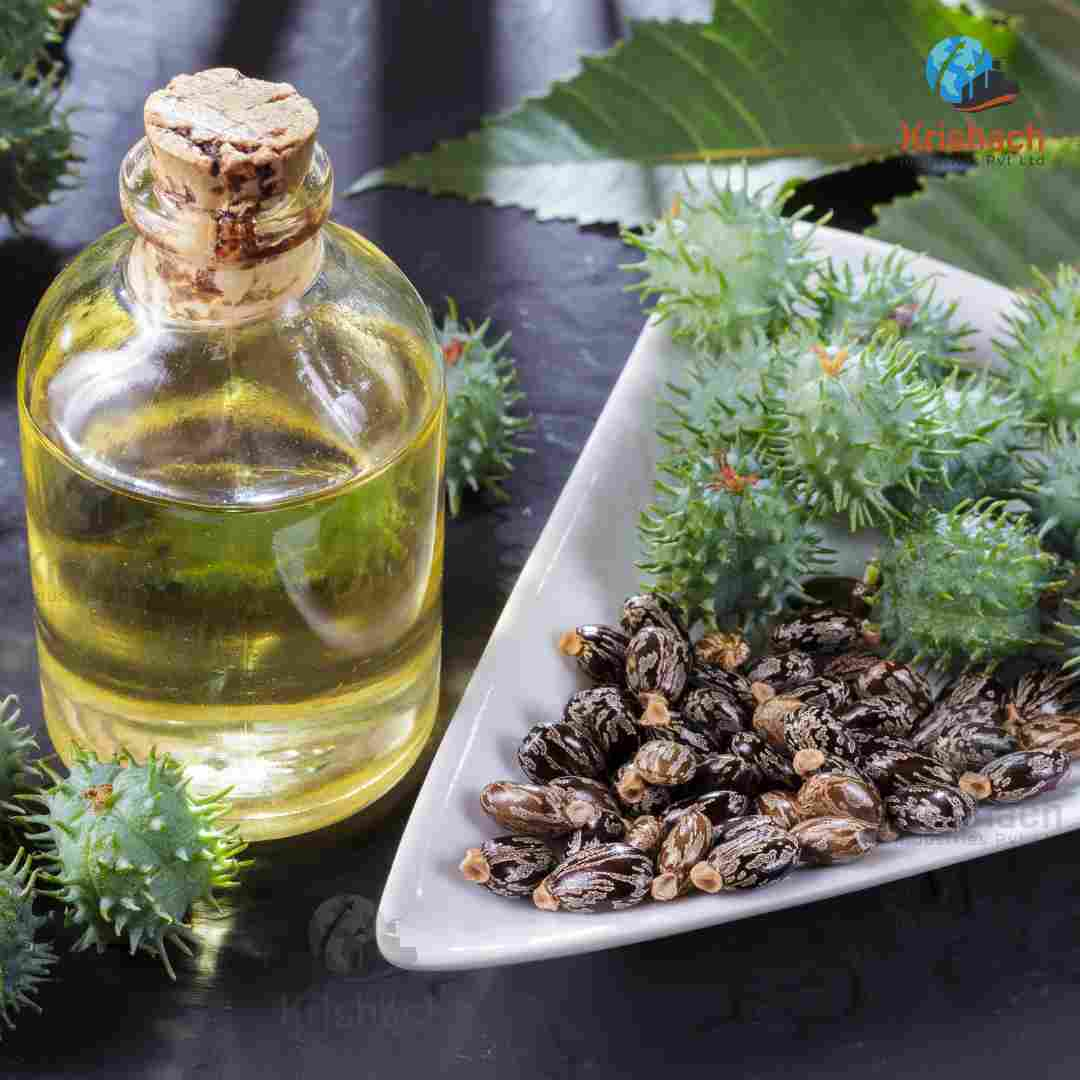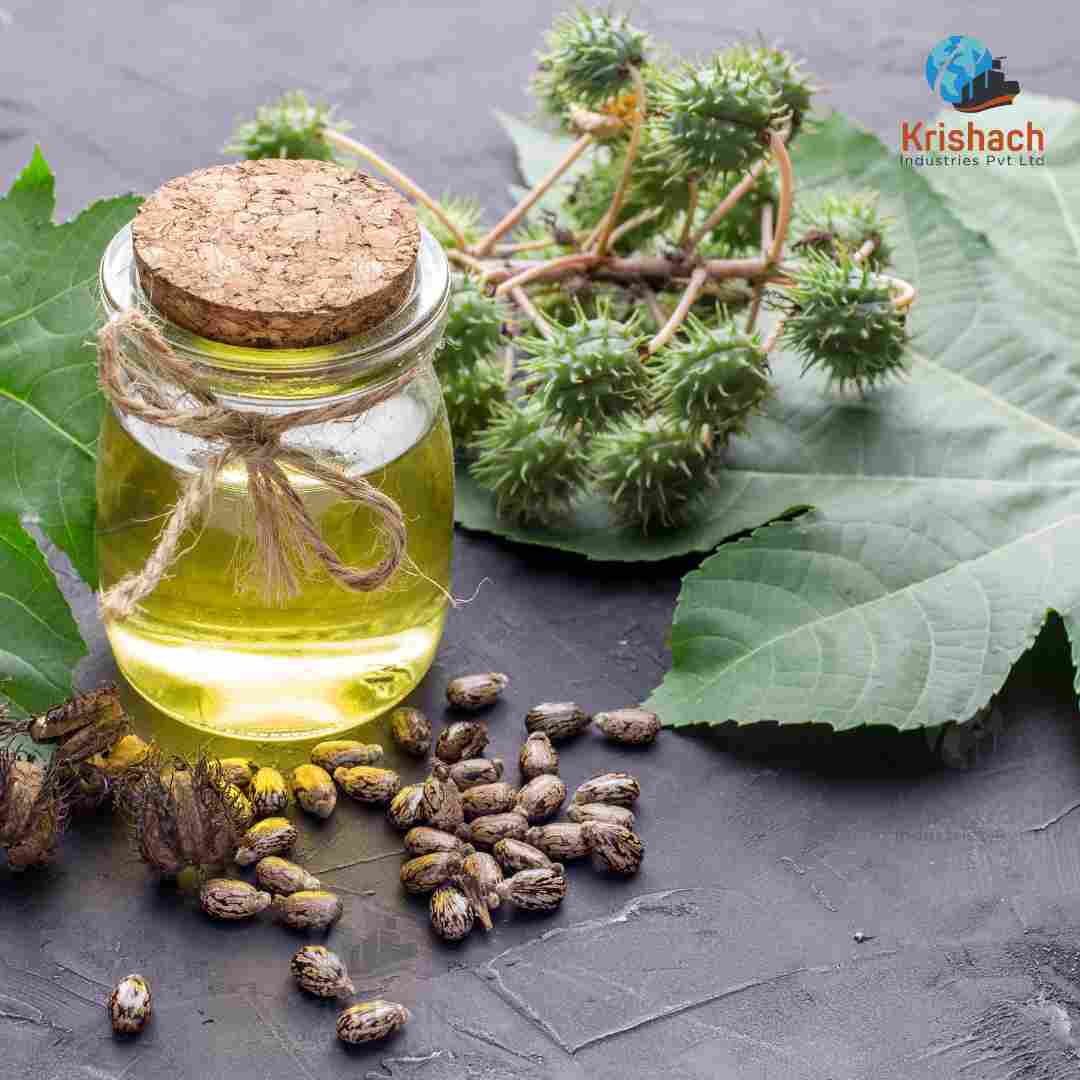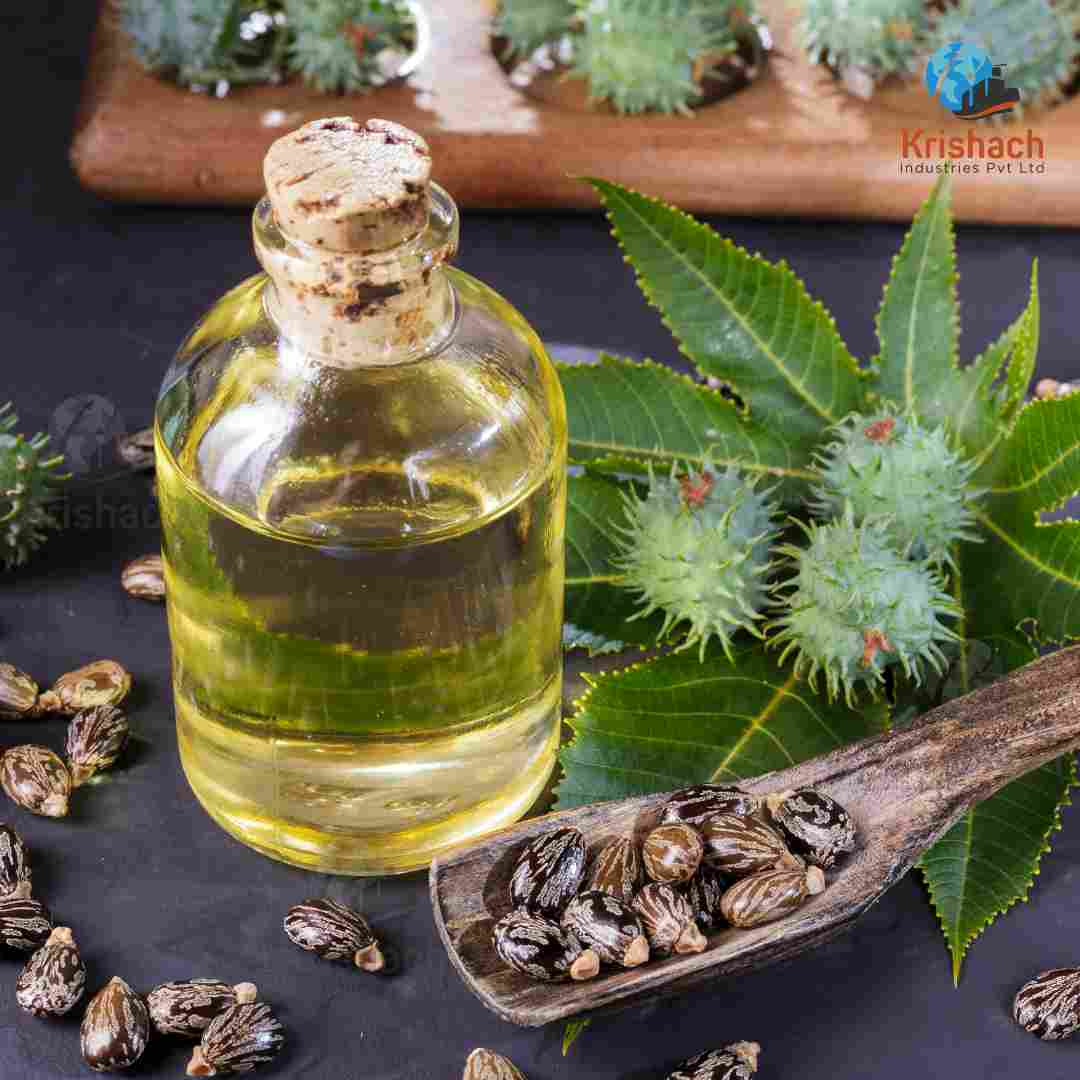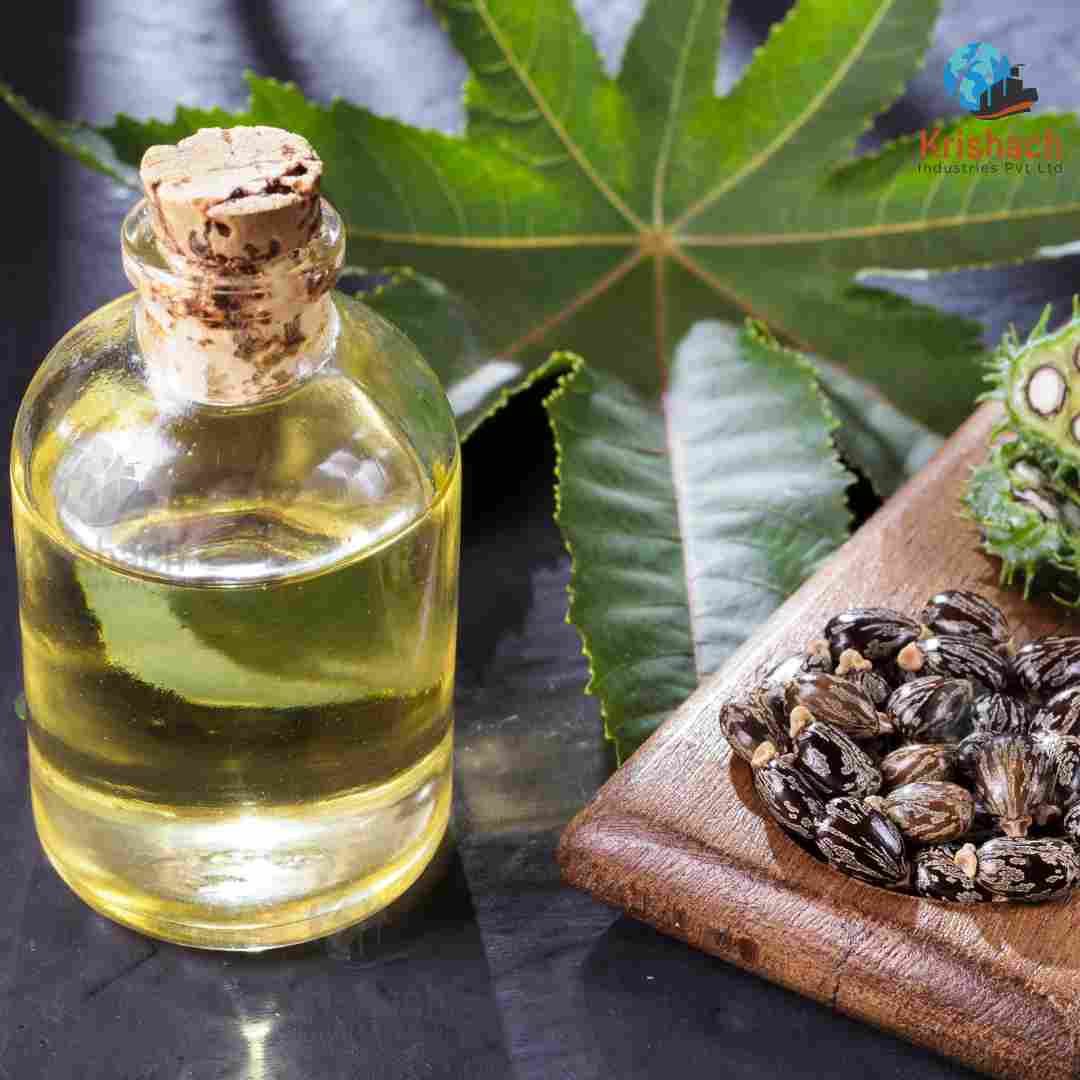Castor oil is a thick, pale yellow vegetable oil extracted from the seeds of the castor plant (Ricinus communis). It is known for its rich texture, high viscosity, and numerous health, industrial, and cosmetic applications. Castor oil contains a unique fatty acid composition, primarily consisting of ricinoleic acid, which gives it distinctive properties such as being a powerful emollient, lubricant, and anti-inflammatory agent.
Key Characteristics:
Appearance: Pale yellow to nearly colourless, with a thick, viscous texture.
Odor: Mild, with a faint earthy or nutty scent.
Flavour: Slightly bland or mild with a faintly bitter taste, though it is not commonly used for culinary purposes due to its strong laxative effect.
Composition: Rich in ricinolein acid (around 90%), which is responsible for its medicinal and industrial uses. It also contains other fatty acids such as oleic and linoleic acids.
Specification:
Uses:
Cosmetics and Skin Care: Castor oil is widely used as a moisturizing agent in lotions, creams, and soaps due to its ability to hydrate the skin and lock in moisture. It is also known for promoting hair growth and is often found in hair care products.
Medicinal: It has been traditionally used as a powerful laxative for constipation relief and is also applied topically to relieve skin inflammation and treat wounds due to its anti-bacterial and anti-inflammatory properties.
Industrial: Castor oil is a crucial raw material in the production of lubricants, soaps, varnishes, and paints. Its unique chemical structure allows it to be used in biodegradable plastics, cosmetics, and pharmaceuticals.
Key Benefits:
Moisturizing: Helps soothe dry skin and acts as a natural emollient.
Anti-inflammatory: Alleviates skin irritation and can reduce inflammation when applied topically.
Laxative: Stimulates bowel movements when ingested in small doses.
Promotes Hair Growth: Used as a hair and scalp treatment to enhance hair growth and reduce dandruff.
Our Services
Reliable Sourcing:
Castor oil is primarily sourced from castor seeds (Ricinus communis), with India being the largest producer, especially in regions like Gujarat and Rajasthan. Reliable sourcing begins by partnering with local farmers and suppliers who follow sustainable agricultural practices. Farmers are encouraged to cultivate non-GMO castor plants using minimal pesticides and organic fertilizers to maintain the purity of the seeds. The quality of the castor seeds is critical, as the oil’s efficacy depends on the health and maturity of the seeds at the time of harvest. Ensuring a consistent supply from regions renowned for castor cultivation guarantees premium raw materials for oil production.
Premium Quality Assurance:
To maintain premium quality standards, castor oil undergoes rigorous quality control measures throughout the production process. After sourcing, seeds are inspected for purity, size, and ripeness. Only the best-quality seeds are selected to ensure the oil’s consistency and high concentration of ricinoleic acid. The seeds are also tested for contaminants, ensuring they are free from harmful pesticides and heavy metals. Castor oil production facilities are certified under ISO, HACCP, and GMP to ensure adherence to international quality and safety standards. These certifications verify that the oil meets stringent guidelines for purity, potency, and consistency, whether used for medicinal, cosmetic, or industrial applications.
Process:
Seed Cleaning: After harvest, the castor seeds undergo mechanical cleaning to remove dirt, stones, and other impurities. This ensures that only clean, high-quality seeds are processed.
Seed Crushing: The seeds are mechanically crushed to extract the oil using cold pressing or solvent extraction techniques. Cold pressing is preferred for high-grade medicinal or cosmetic oil, as it preserves the oil’s natural properties without the use of heat or chemicals.
Oil Filtration and Refining: The extracted oil is filtered to remove impurities, husk residues, and solids. For industrial or cosmetic-grade oil, additional refining steps may be employed to remove unwanted elements, enhance purity, and improve shelf life.
Quality Testing: After extraction, the oil undergoes testing to ensure it meets international quality standards, including checks for ricinoleic acid content, moisture levels, and absence of contaminants. The oil is also tested for its viscosity, color, and aroma.
Packaging: Once the oil is verified to meet quality specifications, it is packaged in airtight, food-grade containers to prevent oxidation and contamination. Different packaging formats (bottles, drums, or bulk containers) are used based on the end-user requirements
Packaging, Shipping & Delivery
Glass Bottles:
For retail and premium segments, Castor oil is commonly packed in glass bottles ranging from 250 ml to 1 liter. Glass helps preserve the oil’s flavor, aroma, and nutritional value while offering a high-quality, premium appearance. These bottles are typically sealed with tamper-evident caps to ensure freshness and prevent contamination.
PET/HDPE Plastic Bottles:
For larger retail quantities, plastic bottles made from food-grade PET or HDPE are used for packaging sizes ranging from 500 ml to 5 liters. These bottles are lightweight, durable, and resistant to damage during transportation. Tamper-proof caps or spouts are used for ease of pouring and preservation.
Tin Cans:
Castor oil for export or bulk use is often packaged in 15-liter or 5-liter tin cans. These metal containers provide excellent protection from light and air, ensuring the oil’s freshness and long shelf life, especially during long-distance transport. Tin cans are strong and durable, making them ideal for large-scale distribution.
Drums and Barrels:
For industrial or large-scale use, Castor oil is packed in large food-grade drums or barrels, typically made of stainless steel or HDPE plastic, ranging from 50 liters to 200 liters. These containers are used for export or wholesale distribution and ensure the oil remains uncontaminated during transit.
Vacuum-Sealed Pouches:
In smaller retail quantities, Castor oil can also be packed in vacuum-sealed pouches to prevent oxidation and preserve its freshness. This type of packaging is lightweight and ideal for travel-size portions.
Carton Boxes and Palletization:
Once bottled or canned, the Castor oil containers are packed in corrugated cardboard boxes for extra protection during transportation. For large exports, these boxes are palletized and wrapped with stretch film or shrink wrap to ensure stability and safety during shipment. Palletization makes the handling of large quantities easier and reduces the risk of damage.
Export Documentation:
Handle all necessary export documentation, including phytosanitary certificates, certificates of origin, and any specific certifications required by the importing country.
Efficient Shipping:
Partner with reliable freight forwarders and logistics companies to ensure timely and safe delivery of goods. Offer multiple shipping options (air, sea, or land) based on customer preferences.



















